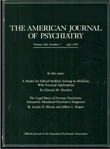In a series of books and more than 200 papers,
Donald Winnicott integrated observation of children with psychoanalytic experience to formulate concepts applicable to psychoanalysis, infant treatment, family treatment, and the study of society; these included the good-enough mother, the holding environment, the transitional object, the meaning of play, the role of hatred in the countertransference, and the normal use of the manic defense. Winnicott described an interpersonal space potentially discoverable in relationships—the transitional space—where nothing is known for certain and everything can be created. Initially between mother and child, this space belongs fully to neither. Within it, the individual can play, develop a sense of personal meaning, and discover creativity and liveliness.
On April 7, 1896, Donald Woods Winnicott was born in Plymouth, England, the youngest child and only son of a merchant, twice mayor of Plymouth. He read medicine at Jesus College, Cambridge. Specializing in pediatrics, he saw more than 60,000 infants, children, parents, and grandparents in consultation. Attentive to both detail and context, he grasped that any bit of behavior reflects the whole interactive system.
Winnicott trained in psychoanalysis with Melanie Klein as a supervisor. He helped develop the Middle Group of the British Psycho-Analytic Institute, carving a niche between Anna Freud's focus on the ego and Klein's attention to unconscious fantasy. He articulated the individual's separation through dependence to a personal way of being, and the hazards of environmental failure. Theory, for Winnicott, was useful to the extent that it illuminated the patient's world. For instance, in his study of the antisocial character, he focused on symptoms as communication. Stealing, he felt, is a sign of hope, in that it reflects the patient's unconscious awareness that he once had his parents' love and feels a right to get it back. Winnicott thought deeply about the defenses generated by environmental failure that block liveliness, spontaneity, and engagement. He said, “To be alive is all.” He taught with wry humor, saying, “I make interpretations [because] if I make none, the patient gets the impression that I understand everything.”
Winnicott saw psychoanalysis as a form of interactive play, yet he believed in the permanent isolation of the individual. He opened the possibility of grasping early developmental failures in the treatment situation and uncovered the therapist's unconscious participation in repetitions of those failures. His work has contributed profoundly to the possibility of treating our most seriously disturbed patients.


